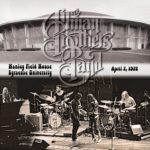The iteration of The Allman Brothers Band that had its shortest run was a five-piece ensemble that toured throughout 1972, following the death of the group’s founder and leader, Duane Allman, in the fall of 1971. The Brothers mourned Duane, then soldiered on, choosing to continue without replacing Skydog’s iconic guitar and, somewhat by default, passing leadership to his sibling, Gregg. In 1973, that role would shift more definitively to guitarist Dickey Betts, after another tragedy- the accidental death of bassist Berry Oakley in the fall of ‘72- would leaving the remaining four reeling, once again.
So, it’s on this April ’72 date from Syracuse University that the strength of the seminal brotherhood- particularly the vitality of Oakley’s insistent, indomitable bass- powers a band playing not just for Duane, but for their lives. The setlist mirrors almost entirely the repertoire they had solidified a year prior with the ultra-classic, At Fillmore East. Only “Ain’t Wastin’ Time No More,” from the freshly-released Eat a Peach, is a newer entry.
Otherwise, the two-disc performance hugs to songs the band had worked out relentlessly on the road since their 1969 inception. Betts takes up for Duane as slide guitarist on the trademark show-opener, “Statesboro Blues,” then, on the remainder, swelters as much or more than he would with a twin-guitar lineup. It’s testimony to how accomplished Betts was as a guitarist- to shine in such a glaring absence.
Oakley continues to excite with his rolling thunder; and as this FM radio-taped appearance chose to mix the group–with Oakley hard in the left channel; Betts hard to the right–his bass registers an even more apparent and full-bodied impression. Gregg is anguished and pure as one of the finest bluesmen of any generation, bolstered by the tireless twin drumming of Butch Trucks and Jaimoe. Extended pieces such as “In Memory of Elizabeth Reed” and “Whipping Post” are understandably different without Duane, but no less dramatic, affecting, and long.
In 1973, Betts expanded his influence as an integral songwriter and vocalist, essentially leading a newly-configured, six-piece ABB on its most successful album, Brothers and Sisters, welcoming Lamar Williams and Chuck Leavell to the family. For ‘72, though, and for the final time it was just the five. And it was the collected effort of those five that kept the spirit burning, and propelled The Allman Brothers Band to live another day.



No Comments comments associated with this post